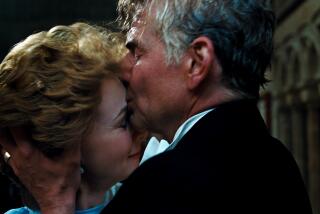Lotte Lehmann as Teacher
- Share via
Regarding Martin Bernheimer’s very interesting coverage of the Lotte Lehmann Centennial Symposium (“Centennial Celebration for a Singing Actress,” June 5), I would like to point out an aspect of the master-class videotapes that was not clearly brought out in Santa Barbara.
National Educational Television was chiefly interested in Lehmann herself, understandably, and wanted to give as much time as possible to her demonstrations. Originally nothing from “Der Rosenkavalier” had been assigned at all. But the TV director felt that a close-up study of Lehmann’s Marschallin would be essential.
Therefore, at the last minute, Kay McCracken Duke was asked to brush up a scene from the production she had done two years before--basically as a pretext so that Lehmann could be filmed as the Marschallin. It was also the director’s decision to feature Lehmann’s reactions rather than the students’ responses to her suggestions and corrections.
The result is that the videotapes seemed to reinforce the occasionally raised objection that Lehmann’s teaching method was to show-off in front of an audience and then to encourage her pupils to try to imitate what she had just done so inimitably. That is a one-sided view and really quite unfair to Lehmann.
Many of her students were transformed in a short time from frightened sticks into effective actors. We learned about style and the communication of expression. She gave us an awareness of the ways in which subtle points of feeling can be projected.
Imitation was certainly a part of it--and why not?
It is instructive to see how someone like Lehmann conveys a point, at close range, as she explains the why and wherefore-- that was unfortunately missing from the videotapes.
She helped many a laid-back California beach type or Midwest farmer’s daughter to learn to move with the dignity and grace of an Old-World aristocrat. Actually, she never asked for imitation. On the contrary, she always warned against it. She hoped her students would grasp the point, and find their own ways to express it.
Nevertheless, Lotte’s way was so convincing that it was sometimes almost impossible to imagine another way of conveying so much so precisely.
She handed on a great tradition, a sense of style--the broad sweep of movement in Wagner, minutely detailed nuances in “Rosenkavalier,” touches of everyday realism in “Tosca.” In her 70s she was able to show young people how to act young and how to play love scenes convincingly.
I do not want to glorify her teaching--I only wish to do it justice. Lehmann was Lehmann. Impulsive, even hasty in her judgments, impatient with dullness or ineptitude. She could, on occasion, cut to the quick. But for those who could take it, those classes were an incomparable learning experience.
BEAUMONT GLASS
Glass, who runs the Opera Workshop at the University of Iowa, is the author of a recent biography of Lotte Lehmann.
More to Read
The biggest entertainment stories
Get our big stories about Hollywood, film, television, music, arts, culture and more right in your inbox as soon as they publish.
You may occasionally receive promotional content from the Los Angeles Times.










